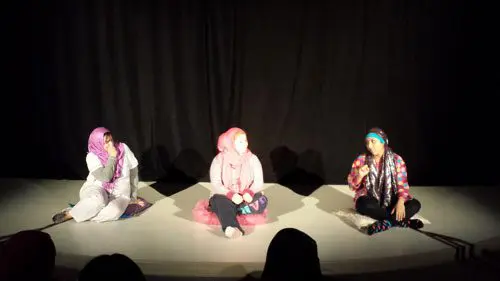
DEARBORN – The University of Michigan-Dearborn hosted powerful performances by the Hijabi Monologues on March 7 and 8. The performances showed that women worldwide, despite their nationality or religion, all share similarities.
The popular group says its focus is on creating a theater space for the experiences of Muslim women, a space to breathe as they are, a space that does not claim to tell every story and speak for every voice.
Through the power of storytelling, the performers share the experiences of Muslim women from different backgrounds. This year the story of a local Muslim woman was told.
The cast of the production was diverse and included Muslims and non-Muslims, including women who wear the Islamic headscarf and others who don’t.
In total, the audience was treated to 11 total performances. This was the second time the Hijabi Monologues performed at UM-Dearborn.
“I remember seeing the impact of it on the students, on everybody who came and I really wanted to bring it back. I think it has been long enough,” said Hanan Hashem, who remembers being touched by the group’s performance two years ago as an audience member.
Hashem is a senior at UM-Dearborn and co-directed the Hijabi Monologues this year with Jamilah Alhashidi.
The auditorium was filled with approximately 90 people each of the two days.
Manal Makki, a performer in the monologues and a UM-Dearborn student, said, “What made the monologues successful was the fact that we were using such a universal medium as acting to present stories of Hijabis that are both personal and relatable.”
Rima Zalghout told her own story through a live performance about suffering with an eating disorder.
Rabab Alrayes, an audience member, says she was captivated by Zalghout’s performance.
“Her story was very moving and similar to a lot of the stories women in our society who suffer from eating disorders, whether they are Hijabis or non-Hijabis, Muslim or non-Muslim, they can relate to it,” Alrayes said.
Hashem hopes the Hijabi Monologues begin scheduling performances at the university annually, because of the importance of the group’s message.
“We wanted to bring people to the world of Hijabi women and kind of show them that we are all the same and we all have different experiences whether you are Hijabi or not, whether you are Muslim or not. It doesn’t even matter,” she said.
Saja Almousawi, another audience member, was very moved by the group’s performances. “The performances were chilling. The depths and truths of the words could be felt like a sea of emotions submerging the audience,” she said.
During intermission, a trailer for the film Honor Diaries was shown. It depicts nine women’s rights advocates and their place in Muslim-majority societies. The film focuses on the women’s efforts to engage in dialogue about gender inequality, as well as their efforts to change their communities.
The proceeds from the performances were donated to First Step and the Arab American Community Center for Economic and Social Services’ domestic violence coalition. The Hijabi Monologues has donated proceeds from its performances to the same groups in the past.
“We wanted the benefit of putting on the monologues to go beyond just watching the show. We wanted to make sure that everyone had the opportunity to make an impact,” said Hashem.






Leave a Reply